| Reviews & Columns |
|
Reviews DVD TV on DVD Blu-ray 4K UHD International DVDs In Theaters Reviews by Studio Video Games Features Collector Series DVDs Easter Egg Database Interviews DVD Talk Radio Feature Articles Columns Anime Talk DVD Savant Horror DVDs The M.O.D. Squad Art House HD Talk Silent DVD
|
DVD Talk Forum |
|
|
| Resources |
|
DVD Price Search Customer Service #'s RCE Info Links |
|
Columns
|
|
|
Wings of Desire - Criterion Collection
THE MOVIE:
"There is no greater story than ours, that of man and woman. It will be a story of giants...invisible...transferable. A story of new ancestors."
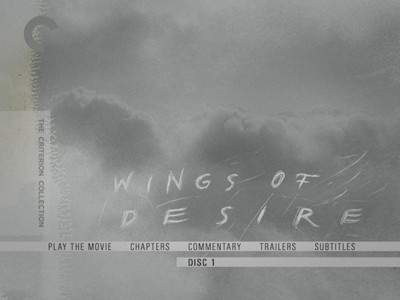
I still remember seeing Wings of Desire the first time. I had heard about it from watching Siskel & Ebert, and knew vaguely that it was the same filmmaker who was responsible for Until the End of the World, which I had not seen either, but I obsessively listened to the soundtrack, which I had purchased for the new Depeche Mode track. Just as that CD had introduced me to a bunch of bands I didn't really know, expanding my musical horizons (Elvis Costello covering the Kinks was like a double-shot of "What's this good stuff?"), Wings of Desire would be important to my understanding of experimental narratives and cinema as art. If nothing else, it made foreign films that didn't have samurais in them a little less scary.
I only begin this way--the first two paragraphs in a movie review shouldn't really lead with a first-person pronoun--because I think Wings of Desire is a "Where were you when?" film. Where were you when you first saw it? Who showed it to you? Who were you? Up until a couple of days ago I had forgotten, for instance, that I had given the previous DVD edition to one of my best movie pals several years ago. He had never seen it before that. Wings of Desire is just that kind of film. Once you've seen it, you don't keep it to yourself. (And you certainly stop anyone you can from seeing the remake. Friends don't let friends watch City of Angels.)
Released in 1987, Wings of Desire is the brainchild of German writer/director Wim Wenders. The filmmaker was at the zenith of his creative powers in this period, with Wings being in the middle of his three best fictional films, sandwiched between Paris, Texas and the aforementioned Until the End of the World. (Seriously, when the hell are we going to get a DVD of that?!) That's some esteemed company, but even amidst those films, Wings of Desire is still the best, the uppermost tip of Wenders' artistic spear.
That's because Wings of Desire is the film that could not be made by anyone else, that could not be made at any other time. This was two years prior to the fall of the Berlin Wall, and I think that fact alone would have changed the tenor of Wenders' masterpiece. Though there is very little mention of the political situation in Berlin at the time, the separation that city felt was very much a part of the subtext. Wings of Desire is about a world divided, about the line between the spiritual and the physical, the fanciful and the practical. Between the poetry of words and thought and the true poetry of life.
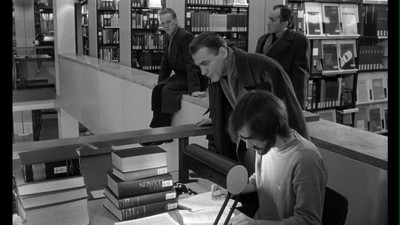
Bruno Ganz stars as Damiel, one of an army of angels assigned to Berlin. In this reality, angels act not as guardians, but as witnesses. They wander through our lives, silent and invisible, observing our activities and eavesdropping on our thoughts. They might follow one person in specific, or they might roam through a crowd, sampling a little something from each. There are wonderful scenes on a plane or in the public library where the sound mixers scroll through the gathered people, moving from one inner monologue to another the way we flip through channels with our TV remote. In the library, there are almost as many angels as there are mortals, all looking for something interesting to commit to memory or maybe scribble down in one of their little notebooks.
Damiel shares just such discoveries with his best friend Cassiel (Otto Sander). After centuries of observing the human race, they are still capable of being charmed by our irrational behavior. Just reporting that he saw a woman close her umbrella and allow herself to be drenched in a downpour brings a smile to Damiel's face. What unpredictable creatures! What must they feel? How do things taste? What's it like to really hold something in your hand? The angels can take objects from us, but they are merely copies and not tangible. It's not the same.
Call it divine existentialism. Our earthly version of that philosophy ponders what it must be like to transcend the physical and join the divine; for an angel, the crisis of identity involves shedding your wings and eternity and becoming flesh. Damiel has grown tired of watching, he wants to start doing things. The final catalyst for "taking the plunge," the human idiom for what is essentially a fall from grace, is a beautiful trapeze artist, Marion (Solveig Dommartin), that the angel has become smitten with. She is his human analogue, soaring above the ground as she does, even wearing a pair of feathery wings. Marion dreams of flying, Damiel dreams of walking--opposites, prepare to attract!
The transformation from heavenly to earthly creature thankfully comes in the final third of the film. Had it come sooner, it would have made for a much cheaper experience. There is nothing wrong with the end of the film, it's actually quite perfect, and Bruno Ganz is at his most compelling as the excited new human rushing through Berlin, seeking every sensation, tasting his first cup of coffee and learning to whistle. His childlike exuberance is infectious. The romantic meeting is also splendid, with Wenders and co-writer Peter Handke avoiding the triteness of love story coincidences by properly joining the fates of Damiel and Marion early on. Though angels can't directly influence a human, they can make their presence felt, and Damiel's constant hanging around lends Marion peace while assuring that he will be familiar to her when they meet face to face. (At a Nick Cave concert no less. Some vintage footage here!)
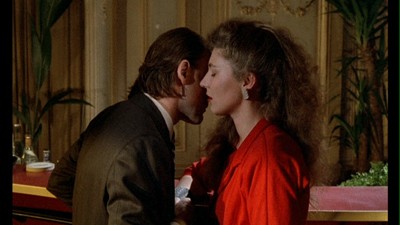
The romance is sort of the cherry on top, and the rest of the movie is the true sundae. It's the build-up, the gathering together and the exploration of this world. Wenders takes us on a tour through the city, showing us people from all walks of life. Under his gaze, living is a lyrical happening. One of Cassiel's favorite people, an old poet named Homer (Curt Bois, who had acted in his first movie eighty years before Wings), asks why no epic ballads have ever been written in tribute to peace the way they have been about war. This would seem to be a personal challenge that Wenders has made to himself and buried within the movie proper. What Cassiel and Damiel observe is like a visual song celebrating an everyday peace. It's not all happy--there is suicide, bills to pay, drug addiction--but there is a nobility to forging ahead, to making your own personal story even if no author is ever going to write it down. It's easy for the angels, they pass through everything unharmed; humans have the ability to touch and be touched in turn. Divinity has its purpose, but as Peter Falk, playing himself as a former angel, informs Damiel, there is nothing to compare to the sensations of the finite.
Falk's role also connects the film to history. He's come to Berlin to make a movie about a private detective in WWII, and extras stand around on the set wearing Nazi uniforms and clothes marked with the Star of David. The past is alive and well within the city, and old newsreel footage is cut into Wings of Desire, seen from car windows, the ghost of memory. It's another division between realms, one of many in the movie. Wim Wenders and cinematographer Henri Alekan (Topkapi), along with assistant director Claire Denis, create a vivid visual division between the heavenly and the earthly. The angels and what they see are shot in crisp, cool black-and-white (restored here to a more silvery hue rather than the gold of previous DVDs) while the mortal experience is shown to us in full color, rich in tone and often garish. Humanity experiences the full spectrum, whereas the angels' vision is limited. For all of their peeping in on our brains, the angels are confined. They can't do anything else. This is the core of existentialism: choice is what makes us free. Our imperfections define us. The brightest light burns half as long.
For all these happenings, Wings of Desire actually ends on a downbeat. Though Damiel has found love and joy with Marion, Cassiel is now alone in the heavenly realm, watching his friend's new life without anyone to talk about it with. His divine plight is one of loneliness, but as the final words of Homer and the "to be continued" card that precedes the credits tell us, this is only the beginning of the story. Like an acorn falling from a tree, Damiel is only the first. The sequel, Faraway, So Close, was several years off, and I don't recall it having the same impact. Maybe it was best to leave well enough alone. Somehow the suggestion that maybe Cassiel will follow Damiel's example is more effective than him actually doing so. It's probably because it allows us all to be Cassiel, looking to a more hopeful future all our own. The follow-up story itself ends up being too specific, and thus not satisfying.
I don't recall movies from the same period being nearly as hopeful as Wings of Desire. Not without resorting to treacle. Wim Wenders manages to avoid the schmaltz. Wings of Desire is the work of an artist who can see a better world on the horizon and is using his art to reach out for it, to pull it closer. His message remains in the abstract, but it's no less effective for not being spelled out. That angelic power of observance, the god's eye view afforded by the camera, equalizes all life in our vision, let's us find ourselves within it, and forever changes how we see things in the process. Or at least that's how it was for me. How about you?
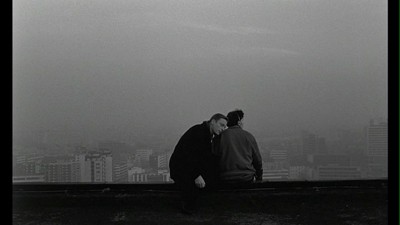
THE DVD
Video:
The new transfer on the Wings of Desire - Criterion Collection is breathtaking. Six years after the last DVD release of the film through MGM, Wim Wenders has teamed with Criterion to do an all-new high-def version that is the best I have ever seen the film. The black-and-white scenes are crisp and lovely, with wonderful detail and nuance. The color sequences really pop, looking far richer than they have on past prints. It's almost like seeing everything for the first time. Grain in some of the darker scenes looks true to the original film stock, and the tonal values throughout are dead-on. Bravo!
Tech specs: The film is 1.66:1, anamorphic. You may see black bars on the left and the right, which are necessary to preserve the sizing. This is an improvement over the 1.78:1 transfer on the 2003 DVD.
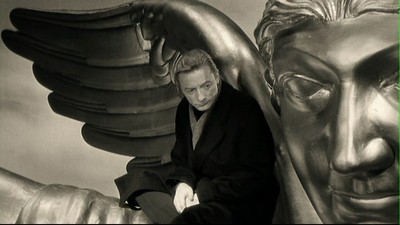
2003
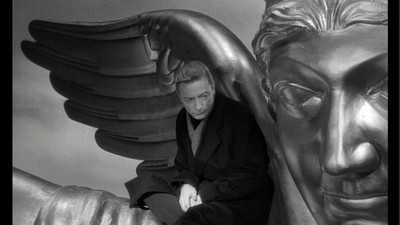
2009
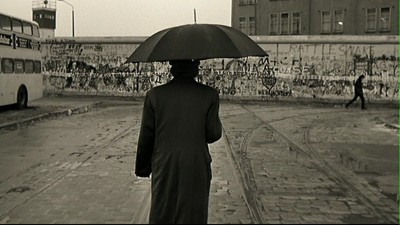
2003
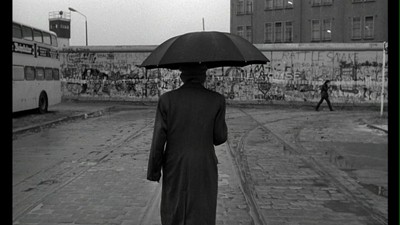
2009
These black-and-white comparisons have an obvious difference. The old disc had a sepia hue that doesn't really match the more traditional black-and-white look Wenders intended. The color comparisons are more subtle.
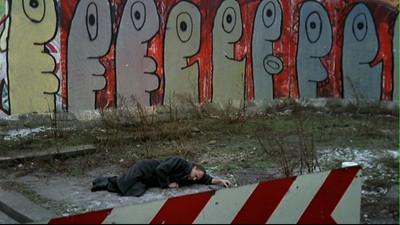
2003
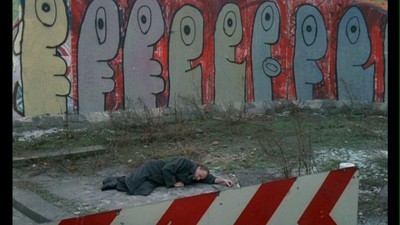
2009
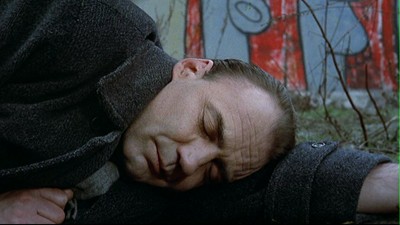
2003
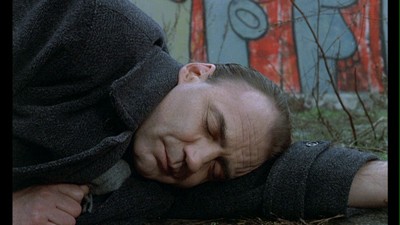
2009
To my eye, the older disc is slightly oversaturated, making for less realistic skin tones. Bruno Ganz is pinker in 2003 than he is in 2009. In the long shot, also look at the grass, compare the greens. In this case, the older disc is more washed out.
In all cases, the pictures from the 2003 disc are also cropped closer to fit in the frame, making the images appear somewhat expanded (quite obvious in the shot of Cassiel at the very top). Information is also lost on all four sides.
Sound:
The multi-lingual soundtrack is given a new 5.1 Dolby mix, another improvement (the old disc was just 2.0). Wings of Desire is a movie with an incredible audio atmosphere, with inner monologues fading in and out and lots of ambient noise, the pulse of life in Berlin. The set-up between the speakers here is excellent, with a true use of surround sound to make the audio come alive in all dimensions. New subtitles for the German and French dialogue appear in white, and they are sharper and better written than the pixilated yellow subtitles of the MGM disc. In just doing my image captures to compare the two versions, I noted subtle tweaks in the writing that give the English translation more finesse.
Extras:
Wings of Desire follows the current Criterion model. The two discs are held in a clear plastic case with a double-tray. The interior booklet contains photos, credits, a chapter listing, a new article by critic Michael Atkinson, Peter Handke's poem that Damiel recites throughout the movie, and Wim Wenders' original treatment for the film.
DVD 1 contains the movie and an audio commentary by Wim Wenders and Peter Falk. This commentary, along with the selection of theatrical trailers, carry over from the 2003 DVD, as do many of the extras on DVD 2.
Those repeated extras are The Angels Among Us, a documentary about the film featuring cast and crew interviews, and a collection of deleted scenes and outtakes, complete with commentary from Wenders. This includes the infamous pie fight scene, which would have just about ruined the movie had Wenders left it in. Missing from the old disc are an interactive map of Berlin and a gallery of advertising artwork--neither of which are essential.
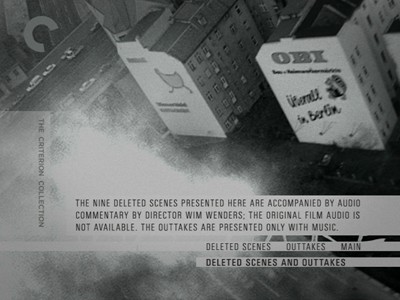
DVD 2 also has several new features to make this Criterion twofer extra special.
A 9-minute, 20-second segment from the French program Cinema cinemas, entitled "Wim Wenders Berlin Jan. 87" cobbles together footage of Wenders on set filming a scene on the fictional movie set for the movie Peter Falk is making in the film, with some introductory thoughts from the director.
Two programs focus on director of photography Henri Alekan. A 1985 interview with the cameraman (10 mins., 15 sec.) is from a documentary about Alekan that was never completed, whereas scenes from Alekan la lumiere (27 mins.) are from a special that aired on French television in 1988, show him talking to Wenders. In both, he talks about his approach to capturing an image, but the latter is the most interesting because Alekan uses a soundstage to create specific situations and explains his lighting theory in detail, even comparing some of his indoor shots to outdoor shots.
Remembrance is a 1982 black-and-white film made by the stars of Wings of Desire, Bruno Ganz and Otto Sander, and it's a profile of their co-star, Curt Bois. This 29-minute, 40-second excerpt from the program shows them talking to Bois about his career as an actor, encompassing his leaving Germany in 1933, his exile in Hollywood, and working with Buster Keaton and Bertold Brecht.
Finally, there is a gallery of photos taken by art directors Heidi and Toni Lüdi, along with notes from them explaining what we are seeing. These show a lot of the sets and props under construction, as well as one preliminary sketch.
FINAL THOUGHTS:
This is the best of the best. Wings of Desire is a top-tier film, one that is endlessly affecting and that always seems bold and new no matter how many times you see it. Wim Wenders' 1987 masterpiece about the angels that walk among us, a portrait of Berlin in specific and all of humanity in general, is poetic, agile, and visually delightful. This new double-disc Criterion edition gives it the full treatment, from a new transfer to a bunch of fantastic supplemental features. I can find nothing to complain about. This is one of those movies that belongs in every home, and is a natural for the DVD Talk Collector Series.
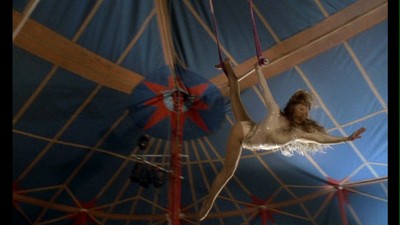
Jamie S. Rich is a novelist and comic book writer. He is best known for his collaborations with Joelle Jones, including the hardboiled crime comic book You Have Killed Me, the challenging romance 12 Reasons Why I Love Her, and the 2007 prose novel Have You Seen the Horizon Lately?, for which Jones did the cover. All three were published by Oni Press. His most recent projects include the futuristic romance A Boy and a Girl with Natalie Nourigat; Archer Coe and the Thousand Natural Shocks, a loopy crime tale drawn by Dan Christensen; and the horror miniseries Madame Frankenstein, a collaboration with Megan Levens. Follow Rich's blog at Confessions123.com.
|
| Popular Reviews |
| Sponsored Links |
|
|
| Sponsored Links |
|
|
| Release List | Reviews | Shop | Newsletter | Forum | DVD Giveaways | Blu-Ray | Advertise |
|
Copyright 2024 DVDTalk.com All Rights Reserved. Legal Info, Privacy Policy, Terms of Use,
Manage Preferences,
Your Privacy Choices | |||||||












